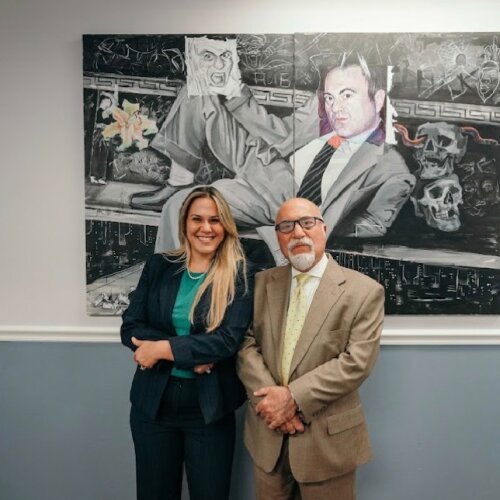Best Residence by Investment Lawyers in New York
Share your needs with us, get contacted by law firms.
Free. Takes 2 min.
Or refine your search by selecting a city:
List of the best lawyers in New York, United States
About Residence by Investment Law in New York, United States
Residence by investment, commonly known as the "Golden Visa," refers to programs allowing foreign nationals to obtain residency rights by making a qualifying financial investment in a country. In the United States, there is no exclusive New York state-level residence by investment program. Instead, the federal EB-5 Immigrant Investor Program is the primary legal framework used by individuals seeking U.S. residency through investment. New York, being one of the most dynamic states, is a popular target for EB-5 investments due to its robust economy and diverse business opportunities.
The EB-5 program requires foreign investors to invest a specified minimum capital in a new commercial enterprise that creates or preserves jobs for U.S. workers. Because these investments often take place directly in New York businesses or real estate, understanding both federal requirements and any relevant state or municipal laws is essential.
Why You May Need a Lawyer
The residence by investment process can be complex and time consuming. A qualified attorney can help you:
- Evaluate your eligibility before making a significant financial investment.
- Navigate the intricacies of the EB-5 program and other possible pathways that could grant residency status.
- Prepare and review the extensive documentation required by the United States Citizenship and Immigration Services (USCIS).
- Ensure compliance with both federal and New York state business, tax, and real estate regulations.
- Handle issues related to source of funds verification, which can be especially complicated for international clients.
- Represent you during any legal proceedings or audits, including in cases of fraud or non-compliance allegations.
- Advise on post-investment requirements, such as job creation targets and conditional green card renewals.
Working with a qualified legal specialist increases your chances of a successful outcome and minimizes the risk of costly mistakes or legal complications.
Local Laws Overview
The essential features of residence by investment in New York focus primarily on the federal EB-5 program but require consideration of several local legal aspects:
- Investment Requirements: As of 2024, the minimum qualifying investment is $1.05 million, or $800,000 if the investment is targeted to a rural area or high-unemployment area. Many projects in New York qualify as Targeted Employment Areas (TEA).
- Business Formation and Compliance: Investors may need to establish new commercial enterprises under New York law and must comply with state business registration and tax obligations.
- Employment Law: The enterprise must create or preserve at least 10 full-time jobs for U.S. workers within two years of the investor’s admission to the United States.
- Regional Centers: Many investors participate through USCIS-approved regional centers based in New York, which are subject to state and local regulation in addition to federal oversight.
- Real Estate Transactions: Investments in property developments require compliance with New York’s robust real estate laws, including contract law, zoning, and disclosure requirements.
- Tax Considerations: Investors should be aware of state and city taxes on income, capital gains, and property, and should seek legal and financial advice to ensure full compliance.
Because both federal and New York laws are at play, a thorough understanding and compliance strategy are essential for anyone considering residence by investment in New York.
Frequently Asked Questions
What is the EB-5 program?
The EB-5 Immigrant Investor Program is a federal initiative that allows foreign nationals to obtain a U.S. green card by investing a specified amount in a qualifying U.S. business that creates or preserves at least 10 jobs for American workers.
Is there a specific residence by investment program just for New York?
No, there is no New York state-level residence by investment program. Applicants use the federal EB-5 program, but the investment can be made in qualifying projects located within New York.
How much do I need to invest to qualify for a green card?
As of 2024, the minimum investment required is $1.05 million or $800,000 if the project is in a Targeted Employment Area.
Can I invest in real estate to qualify?
Yes, many EB-5 projects in New York involve real estate developments. However, the investment must be structured properly, and the project must meet all job creation requirements.
Do I have to start my own business?
No, investors can either create their own business or invest through a USCIS-approved regional center, many of which operate projects in New York.
How long does the EB-5 process take?
The processing time varies but can range from 2 to 5 years or more, depending on factors such as country of origin, project type, and government backlogs.
What are the risks involved?
Investment projects carry financial risks, and there is also the risk of denial if the project fails to meet job creation or other eligibility criteria. Working with experienced legal counsel can help mitigate these risks.
What proof of funds do I need to provide?
Investors must provide extensive documentation to prove the lawful source of their investment funds. This can include business records, tax returns, bank statements, and more.
Will my family be included in my application?
Yes, your spouse and children under 21 years old can be included in your EB-5 petition and receive green cards if your application is approved.
Do I need to live in New York if I invest there?
No, you are not required to live in New York even if your investment is made there; you are generally free to reside anywhere in the United States after obtaining your green card.
Additional Resources
For further guidance and assistance on residence by investment in New York, the following resources may be helpful:
- United States Citizenship and Immigration Services (USCIS) - Provides all official information and guidelines on the EB-5 program.
- American Immigration Lawyers Association (AILA) - Offers directories of qualified immigration attorneys and policy updates.
- New York State Bar Association - Helps locate local lawyers with experience in immigration and investment law.
- Regional Centers Directory (available through USCIS) - Contains a list of USCIS-approved regional centers operating in New York projects.
- New York State Department of State - For business entity registration and compliance.
- Local economic development agencies - Offer information about investment opportunities and compliance in New York.
Next Steps
If you are considering residence by investment in New York, the following steps can help ensure a smoother process:
- Research the EB-5 program requirements and evaluate if you are eligible.
- Consult with a qualified immigration attorney experienced with EB-5 and New York-specific investments.
- Gather and review financial documentation to demonstrate your investment funds are lawful.
- Evaluate different investment projects, with the assistance of legal counsel, to ensure compliance and potential success.
- Prepare the required USCIS applications and supporting documents with legal guidance.
- Maintain regular communication with your legal advisor to respond promptly to any government inquiries.
Taking these steps with the help of a knowledgeable attorney maximizes the likelihood of obtaining U.S. residency through investment with minimal risk.
Lawzana helps you find the best lawyers and law firms in New York through a curated and pre-screened list of qualified legal professionals. Our platform offers rankings and detailed profiles of attorneys and law firms, allowing you to compare based on practice areas, including Residence by Investment, experience, and client feedback.
Each profile includes a description of the firm's areas of practice, client reviews, team members and partners, year of establishment, spoken languages, office locations, contact information, social media presence, and any published articles or resources. Most firms on our platform speak English and are experienced in both local and international legal matters.
Get a quote from top-rated law firms in New York, United States — quickly, securely, and without unnecessary hassle.
Disclaimer:
The information provided on this page is for general informational purposes only and does not constitute legal advice. While we strive to ensure the accuracy and relevance of the content, legal information may change over time, and interpretations of the law can vary. You should always consult with a qualified legal professional for advice specific to your situation.
We disclaim all liability for actions taken or not taken based on the content of this page. If you believe any information is incorrect or outdated, please contact us, and we will review and update it where appropriate.
Browse residence by investment law firms by city in New York
Refine your search by selecting a city.
















